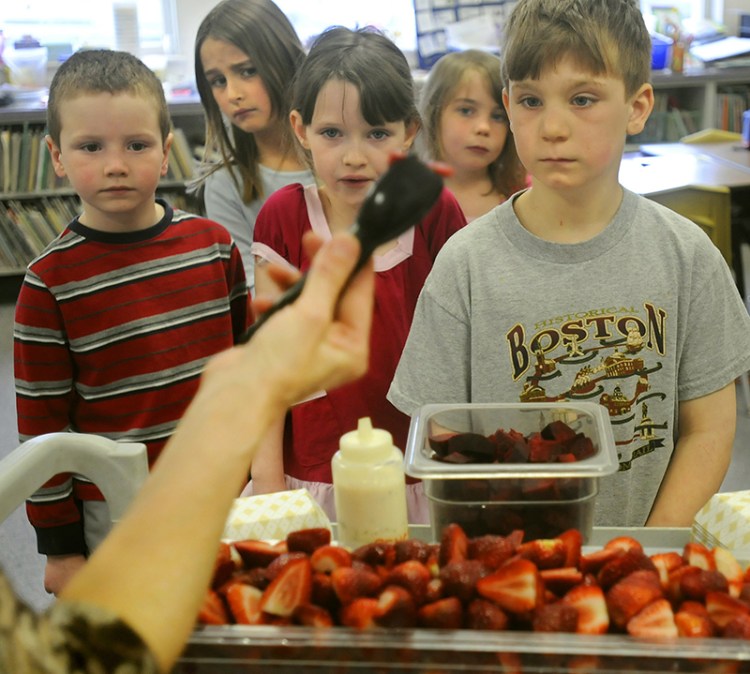The retired U.S. senator from Iowa who created the national Fresh Fruit and Vegetable Program is accusing Maine Republican U.S. Rep. Bruce Poliquin of taking steps that could destroy it.
Former U.S. Sen. Tom Harkin, who served for three decades until his 2015 retirement, said, “This character from Maine” is so determined to let schools buy more frozen blueberries from 2nd District farms that he’s willing to undermine the entire rationale for a program that gives more than 4 million low-income schoolchildren fresh produce.
The program covers schools in every state – 165 in Maine – and typically provides snacks several times a week that vary from place to place but often include fresh grapes, apples, bananas, oranges, strawberries or carrots.
The new farm bill heading for a vote in the U.S. House includes Poliquin’s proposal to allow frozen, canned, pureed and dried fruits and vegetables to substitute for fresh produce, a switch backed by both the House Agriculture Committee and the California Farm Bureau.
Harkin said if the proposal wins passage, “then it won’t be a Fresh Fruit and Vegetable Program,” except in name.
Poliquin said, though, that adding “better access and more nutritious choices” would help students eat healthier. He said inclusion of his proposal in the farm bill “is a huge win for our schoolchildren and the hardworking producers in Maine, such as our wild blueberry harvesters, who provide these nutritious foods.”
Nancy McBrady, executive director of the Maine Wild Blueberry Commission, said wild blueberries that are “frozen at the height of freshness” are just as good as they are fresh – and because their season is so short, children won’t get much exposure to them without using frozen berries.
McBrady said that perhaps Poliquin’s proposal needs tweaking – she doesn’t want to see fruit packed in sugary water – but she said the goal of adding to the program’s options is a good one.
But Harkin, a 78-year-old Democrat, said there’s no need to open the door to produce that isn’t fresh.
“They can go and get these fresh blueberries now,” Harkin said. “What could be better than fresh blueberries? Nothing. Get those fresh blueberries out to kids.”
Harkin said the snack program he created to get fresh fruit and vegetables to children is one of his proudest achievements and he would hate to see it undermined by turning it into yet another excuse to shovel “processed food” at youngsters.
Brendan Conley, Poliquin’s spokesman, said Thursday the congressman’s proposal “is absolutely not about putting ‘junk food’ into school cafeterias. The proposal, which has the bipartisan support of 14 Democrats and Republicans, is about increasing the access and availability of nutritious foods to schools and students.”
Poliquin explained his support for a change in 2015, when he first began pushing for a revision. He said then that “by enabling schools to serve fruits and vegetables, in a variety of forms, we are not only increasing the market for Maine’s hard-working farmers to sell their products, but we are teaching children that nutritious foods come in many different sizes, shapes, colors and packages – from frozen blueberries, to canned peas, to fresh peaches and dried apricots.”
Cecily Upton, a FoodCorps co-founder and its vice president of innovation and strategic partnerships, said programs like the one Harkin started offer a chance for students to sample something new and different.
Sam Sampson, a Waldoboro eighth-grader, said the fresh food program at his school got him so interested in agriculture that he plans to become a farmer.
He said he already created a garden at his house with peppers, squash, broccoli, beets and potatoes — all better alternatives to much of what he’s seen at school in past years.
A FRESH FOOD PILOT PROJECT
As a longtime member of the U.S. Senate’s Agriculture Committee, Harkin said he took an interest in the school lunch program and discovered most of it “was just junk food.”
Students “weren’t getting anything fresh,” Harkin said.
He set out to change that.
As the new chairman of the agriculture panel, he had the clout to introduce a pilot program to give fresh fruit and vegetable snacks to children. So he put some minimal funding in place to let 25 schools in four states serve as experiments.
When Republicans recaptured the Senate, pushing him out of the chairmanship, Harkin said he worried his experimental program might die. Instead, he found that Republican senators wanted it to grow.
By the time he returned to the committee’s leadership in 2008, Harkin decide to lock the program into the permanent budget and increased funding to $170 million a year now.
Harkin said that he will press his old colleagues to block Poliquin’s efforts to gut his program.
The farm bill, approved this week on a party-line vote by the House Agriculture Committee, has a long legislative course to follow before it becomes part of the next federal budget, including securing the backing of U.S. senators who may prove less willing than House members to undercut a signature program of one of their former colleagues.
Send questions/comments to the editors.




Comments are no longer available on this story